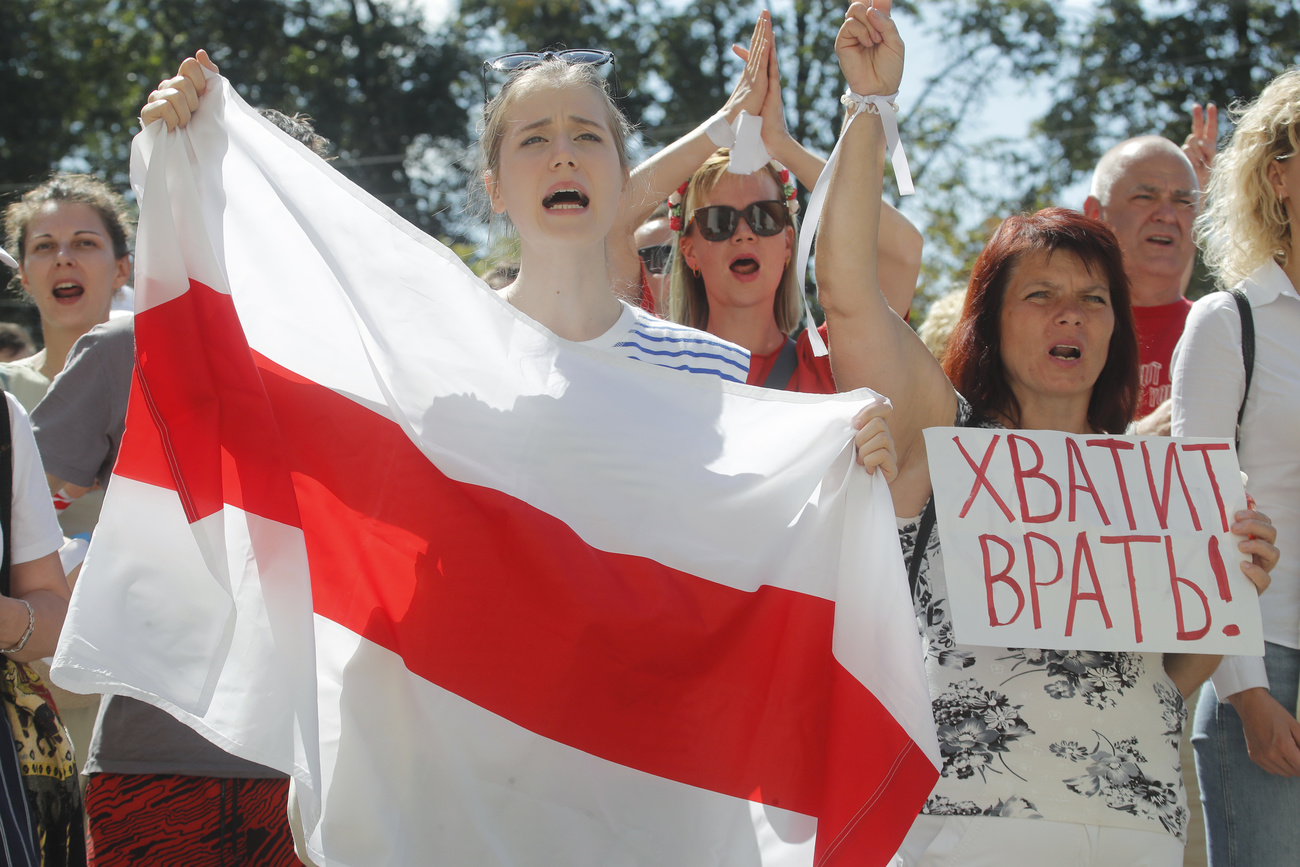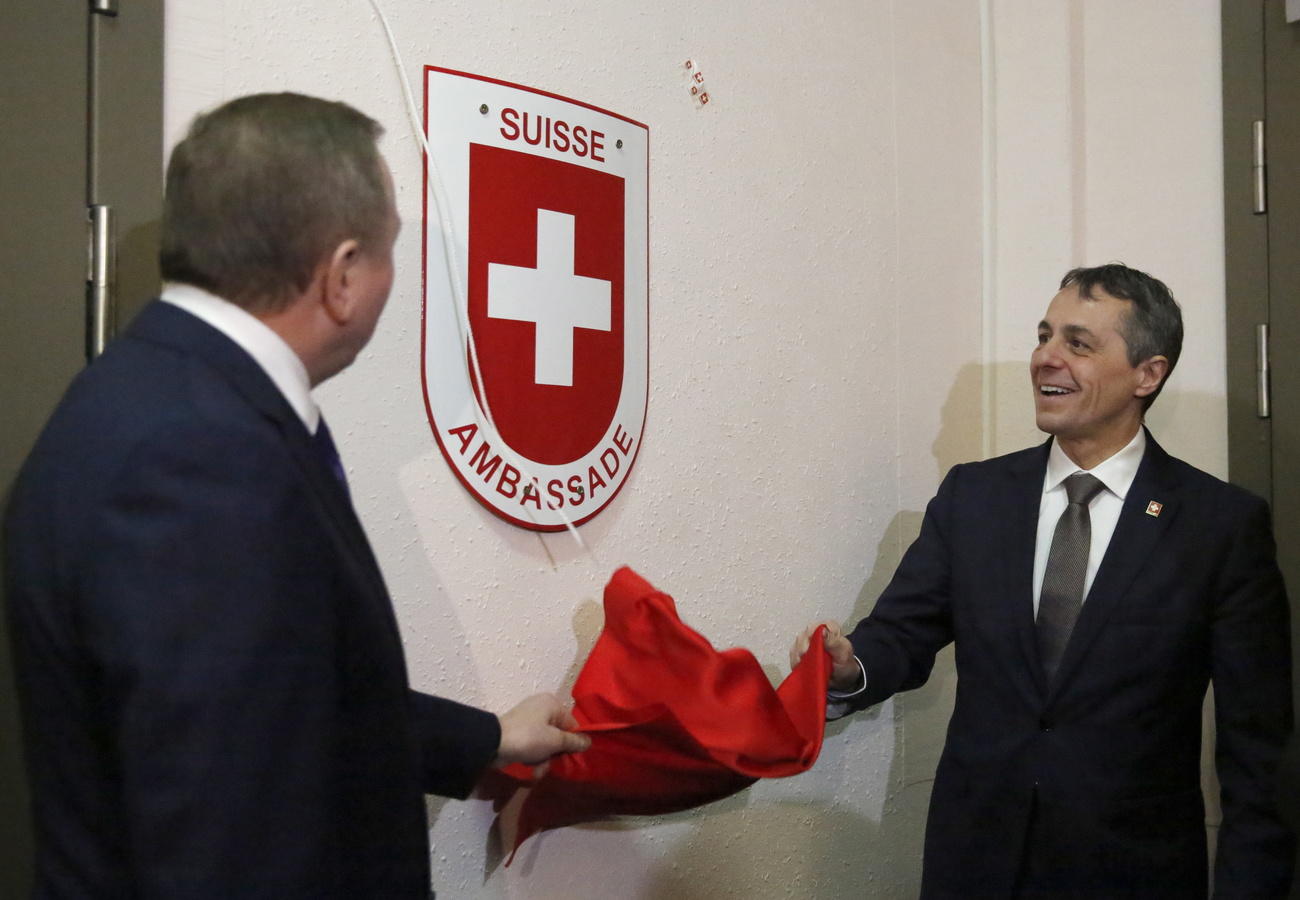
Crisis puts spotlight on Swiss relations with Belarus

The crisis now unfolding in Belarus is a source of embarrassment for Swiss diplomats, who earlier this year tried to revive bilateral relations with a country that some refer to as “Europe’s last dictatorship”.
Until 2019, Switzerland had what is known as an embassy office in the Belarusian capital. But a decision was made to upgrade it to a real embassy to mark the beginning of a new phase of deepening relations, both diplomatic and economic, between the two countries.
“The inauguration of the embassy is a sign of the growing importance of our relationship and pays tribute to the role Belarus plays in the region,” said Ignazio Cassis, the Swiss foreign minister, during the opening ceremony of the new diplomatic headquarters in Minsk last February.

More
Swiss upgrade diplomatic representation in Belarus
Relations on pause
Since the creation of the new republic following the break-up of the Soviet Union in 1991, bilateral relations between Belarus and the Alpine nation had remained largely frozen. This was partly because Belarus was one of the few Eastern European countries to remain under the strict influence of Moscow, thanks to its geographical proximity to Russia.
With a gross domestic product slightly higher than that of Lithuania, Belarus had not attracted many Swiss investors. Instead, Swiss companies have preferred to open subsidiaries in neighbouring countries, such as the Czech Republic and Hungary, which joined the European Union in 2004. Since the communist era, the Belarusian economy has remained focused mainly on heavy industry and petrochemicals, sectors in which Swiss companies are not very active.
Even politically, the regime of Alexander Lukashenko had not encouraged a rapprochement between his country and the EU or Switzerland. In recent decades the United Nations Human Rights Council, the Council of Europe and various NGOs have regularly denounced the systematic violation of fundamental rights in the “last dictatorship in Europe”, as Belarus is often called.
Surprising thaw
Given the current protests by tens of thousands of people in the streets of Minsk, the decision of the EU and Switzerland to review their policy towards Lukashenko and to begin a “thaw” in relations may come as a surprise. In 2016, in agreement with Brussels, the Swiss government had lifted a large chunk of sanctions imposed on Minsk ten years earlier, including the freezing of Belarusian assets and economic resources.
Following a meeting with President Lukashenko on the occasion of the opening of the Swiss embassy in Minsk, Cassis said that Switzerland was satisfied with the close cooperation with Belarus on human rights – a vision apparently shared by the people and companies behind the creation in early 2020 of a new Swiss-Belarusian friendship association.
“In Switzerland there is little knowledge of the country, the population and the situation in Belarus,” former parliamentarian and president of the association, Margret Kiener Nellen, told Swiss public broadcaster SRF in February. “And we perceive them through prejudices.”
Created to strengthen social, cultural and economic ties between the two countries, the association said in a statement published last Sunday that it “deplores and condemns the brutal violence to which the population of Belarus has fallen victim”.
Modest trade numbers
In addition to political and cultural relations, there has recently been an increase in economic exchanges between the two countries. In 2019, the volume of trade reached CHF194 million ($213 million; CHF 143 million in exports and CHF51 million in imports), over 50% more than in the previous year.
This increase is largely due to the activities of the Swiss train manufacturer Stadler Rail, which in 2013 opened a factory near Minsk at a cost of CHF80 million to produce train cars for the Eastern European market.
“The potential for renewing rolling stock in the countries of the former Soviet Union, and particularly in Russia, is great,” says the Swiss company on its website. It has already concluded a series of contracts with railway companies in Belarus, Russia, Azerbaijan and Georgia.
In addition to train cars and machinery (which accounted for nearly half of all exports in 2019), Switzerland exports to Belarus pharmaceutical products, metals, watches and synthetics. The main imports are precious stones and metals, vehicles, food products and furniture. Last year, Switzerland was the 13th largest foreign investor in Belarus, to the tune of CHF76 million, most of which came from Stadler Rail.
Other major Swiss-owned companies with a presence in Belarus include the transport and logistics company Asstra, the watchmaker Lutsch, part of the Frank Müller Group, and coach manufacturer Hess.

In compliance with the JTI standards
More: SWI swissinfo.ch certified by the Journalism Trust Initiative































Join the conversation!